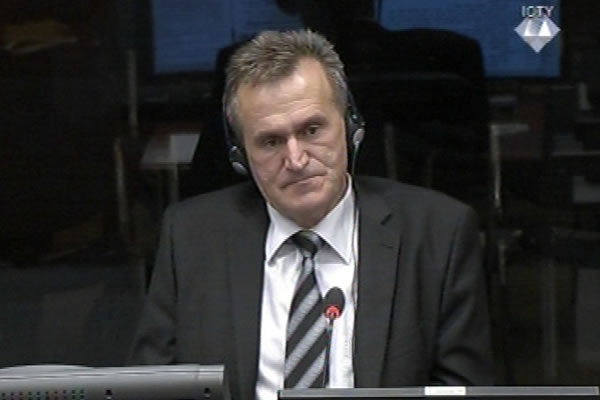Home
PRISONERS WERE KILLED IN LINE WITH GENEVA CONVENTIONS
Mladic’s defense witness claimed that during the war the Serb fighters in Rogatica observed the Geneva Conventions. The prosecutor was prompted to contest the claim with a report by the Rogatica Brigade commander, which states that in the summer of 1995 after the fall of Zepa ‘five Balijas were arrested and killed’. According to the document, an unarmed ‘Ustasha from Srebrenica’ was also killed
 Milenko Jankovic, defence witness at Rako Mladic trial
Milenko Jankovic, defence witness at Rako Mladic trial Continuing the cross-examination of Milenko Jankovic, who commanded a unit in the Rogatica Brigade during the war, the prosecutor referred to the statement the witness gave to the defense. During the war, the witness claimed in the statement, the Bosnian Serb army observed the Geneva Conventions and respected the rights of prisoners. Prosecutor MacDonald showed a report by Rajko Kusic, the Rogatica Brigade commander, where he states that on 7 August 1995, five ‘remaining Balijas’ were captured as they moved along the Praca river canyon and were then killed.
According to the document, an ‘unarmed Ustasha born in Srebrenica was also killed’ that day. The man was 24 years old; ‘before he died, he said that he had stayed back and that he had been looking for food’. The prosecutor suggested that killing prisoners ‘is not in line’ with the Geneva Conventions. ‘That’s right’, the witness replied briefly.
In the re-examination, defense counsel Lukic noted that the document never specified that the 24-year old from Srebrenica – described as ‘an unarmed Ustasha’ – had been captured at all. The victim may have been an unarmed soldier in a group of armed fellow fighters who had opened fire at the Serb soldiers and had been killed in the cross-fire, the defense alleged. Lukic put it to Jankovic that the Geneva Conventions do not require the captors to check which of the prisoners are armed and which are not, and Jankovic agreed.
At the end of Jankovic’s evidence, the defense complained about the English translation of Kusic’s report. A translator’s note was added next to the term balija, explaining that it was a ‘derogatory term for Muslims’. When presiding judge Orie asked if Lukic called into question the claim that ‘balija’ was a derogatory term from Bosnian Muslims, Lukic said that it didn’t have to be the only interpretation. ‘I am from Bosnia and I need to say that different people have different interpretations of the term, and even Muslims call each other that’, the defense counsel explained. The presiding judge then noted that this issue had been raised at the trial before, adding that the Trial Chamber would verify earlier interpretations.
After Jankovic completed his evidence, Mladic’ defense called a protected witness from Foca, who testified under the pseudonym GRM 277. During the war the witness was a nurse in the Bosnian Serb army. Her special task was to treat members of the InterventionSquad also known as the Dragan Nikolic. According to the witness, the infamous Foca rapists convicted in The Hague Radomir Kovac, Zoran Vukovic and Dragan Zelenovic fought in that unit.
In the cross-examination, prosecutor Bibles tried to get the witness to confirm that the unit was part of the Bosnian Serb military structure. The witness replied that until July 1992 in Foca the army wasn’t organized. She was also evasive as to who issued orders to the Dragan Nikolic unit after that time.
As the hearing today drew to a close, the defense called Ratomir Maksimovic. He was an officer in the Sarajevo-Romanija Corps command during the war. In his evidence tomorrow, Maksimovic will speak about his war time meetings with the accused general Mladic.
Linked Reports
- Case : Mladic
- 2014-10-13 ROGATICA TEEMING WITH MUSLIM ‘VOLUNTEERS’
- 2014-10-02 CONTRADICTORY VIEWS OF SANSKI MOST CONFLICT
- 2014-10-01 KOTOR VAROS: FROM CRIME TO GENOCIDE
- 2014-10-15 PROSECUTOR IGNORES WITNESS’S EULOGIES ABOUT MLADIC
- 2014-10-16 CRIME COMMITTED BY ‘DERANGED PERSON’ OUT OF MLADIC’S CONTROL
- 2014-10-20 RESPONSIBILITY OF THE ARMY FOR EXECUTION OF PRISONERS IN RASADNIK FARM
